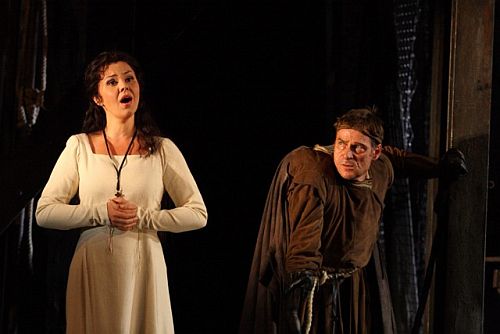 United Kingdom Verdi, Rigoletto: Soloists, Chorus and Orchestra of the Royal Opera House, Covent Garden/Maurizio Benini (conductor). Royal Opera House, Covent Garden, London, 12.9.2014 (CC)
United Kingdom Verdi, Rigoletto: Soloists, Chorus and Orchestra of the Royal Opera House, Covent Garden/Maurizio Benini (conductor). Royal Opera House, Covent Garden, London, 12.9.2014 (CC)

Cast
<table>
Rigoletto,Simon Keenlyside Duke of Mantua,Saimir Pirgu Sparafucile,Brindley Sherratt Gilda,Aleksandra Kurzak Monterone,Sebastian Holecek Giovanna,Elizabeth Sikora Maddalena,Justina Gringyte Marullo,Duncan Rock Matteo Borsa,Luis Gomes Count Ceprano,Jihoon Kim Countess Ceprano,Kiandra Howarth
</table>
It is worthwhile stating at the outset that this particular evening’s Rigoletto belonged to two gentlemen: the expert conducting of the experienced Maurizio Benini and the singing and acting of Simon Keenlyside in the title role. Benini has provided much joy over the years, not least in a 2012 revival of Tosca and conductor of one of the many performances of Traviata that very year. He lives and breathes this repertoire, and it shows. Notwithstanding opening night jitters in the brass at the very opening, this Rigoletto was played with style and panache by the orchestra. Benini’s view is the long-range one, which can result in unexpected tempi to those used to conductors who treat Verdi as eminently excerptable; the expectedly langorous can fly past (or even the expectedly rapid can seem over-pressed at first flush: “Questa o quella” was a case in point); conversely the perceived swift can suddenly be given new space and light, all in the service of the grand arch of the act and, indeed, the shape of the opera as a whole. The pay-off is that the dramatic, structural highpoints emerge with real power. Monterone’s Curse was the perfect exemplar, with Sebastian Holecek rising ably to the occasion. Holecek is a member of the Vienna Volksoper, and he debuted here in Zauberflöte in the 2012/13 season – one hopes he may become something of a regular.
David McVicar’s production was first aired in 2001 and is seen here in its seventh (no less) revival. Michael Vale’s set designs conjure an oppressive world, one so uniformly dark as to evoke parallels with Shakespeare’s Macbeth. The quasi-pornographic revellings of the opening conjure an amoral world where anything goes and Satan himself rules. The set is sparse, with a revolving centrepiece that acts for a variety of locations, including Rigoletto’s slum-like abode. Given that the entire opera is enveloped in this near-darkness, it was entirely fitting that Benini’s conducting was impeccably consist, and that Keenlyside’s assumption found such power here. Keenlyside’s shading of phrases and diction gave great joy, as did his liquid legato; his projection of emotion (particularly distress, as in Gilda’s disappearance in the second act) brought us right into the tragedy. This is Keenlyseide’s first Rigoletto for the Royal Opera and one fervently hopes it is not his last (he has in fact sung it in major venues elsewhere, including the Vienna State Opera).
The Duke on this occasion was Albanian tenor Saimir Pirgu. Rather off-form for much of the opera, he is possessed of a huge voice but one which, on this occasion at least, had problems in its lower reaches; thankfully, he found himself more in the role by the final act. Much more fascinating was Polish soprano Aleksandra Kurzak’s Gilda. Her voice is pure and decidedly low-vibrato, enabling her to impart a most apt freshness to the role. Her agility is beyond doubt, her trills perfect; yet she is capable of remarkable tenderness, too, and her “Caro nome” was a highlight of the evening. Kurzak shares the role with Eri Nakamura over the course of the run – it would be interesting to compare their approaches. Mezzo Elizabeth Sikora was the perfect foil for Kurzak’s Gilda, full voiced and dramatically present. Although not as resonant or as blacky evil as, for example, Alastair Miles’ Sparafucile, Brindley Sherratt nevertheless projected some of the vileness of this murderer-villain in a reading that seemed on a par with that in the 2006 Rigoletto over the road at the Coliseum.
All of the smaller roles were cast from strength, with perhaps a special mention due for Jihoon Kim’s Ceprano and Justina Gringyte’s Maddalena.
If the cast was not as even as one might have hoped, this remains an unforgettably staged Rigoletto. Resolutely shorn of any hint of the plush, the experience zooms in on the corrupt and becomes all the more disturbing for it.
Colin Clarke